*An interview with Nathan Hirsch, owner & CEO of EcomBalance.
My name is Nathan Hirsch. I’m a long time entrepreneur. I started selling on Amazon way back in 2008, before there were courses and gurus and eCommerce software. My partner and I sold about $25 million over a seven year period, mostly dropshipping from U.S. manufacturers. And we then turned that into a marketplace for eCommerce sellers to hire virtual assistants and freelancers called FreeUp.
We grew that business to eight figures. That company was acquired back in 2019, and having great financials was just a big part of being able to sell the company. We were not only able to make good decisions every month based on what the numbers were telling us, but we had clean financials to go to a buyer and pass due diligence.
And so we kind of came up with the idea of launching a monthly bookkeeping service for eCommerce sellers called EcomBalance. We launched that about a year ago. We work with lots of different eCommerce clients, Amazon, Shopify, Walmart to do their monthly bookkeeping, and our service is pretty simple. We charge you on the first, you get your books by the 15th, income statement, balance sheet, cash flow, and we have a team of highly skilled eCommerce bookkeepers.
Bookkeeping is the lifeblood of your business. There’s a lot of benefits to having clean books, like you can get funding and get investments and maybe sell your company. But the real reason to do bookkeeping every single month is for decisions. Without good bookkeeping, you’re just making decisions off guesses, off estimates, off not real data and information. And with an eCommerce business, there’s so many moving parts.
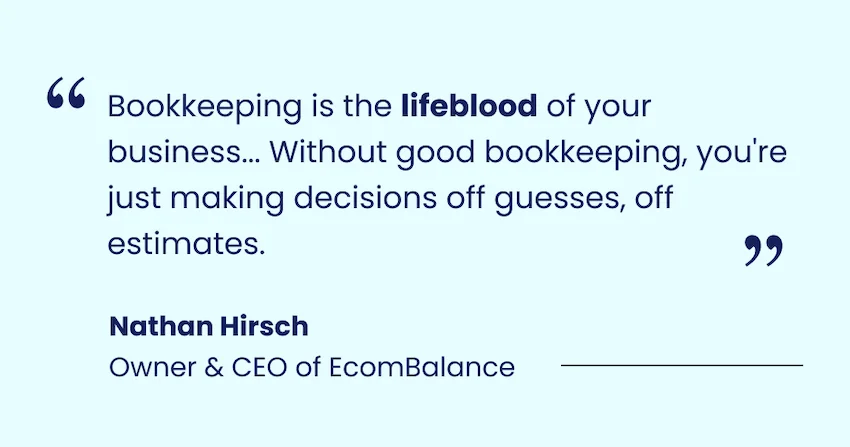
You might have five different marketplaces, but you’re only profitable on two of them. You might be selling 100 products, but you’re only making money on some of them. You’ve got shipping costs, you’ve got cost of goods, you’ve got inventory, you’ve got labor. There’s so much going on, and if you don’t have an accurate picture of what your business is doing each month, if you’re not looking at the income statement, the balance sheet, the cash flow in a monthly finance meeting every single month, you’re not going to be able to make good decisions about your business.
A lot of eCommerce sellers fly by the seat of their pants. They just look at their sales numbers. They just look at the money getting deposited into their bank account. And that is a poor way to make decisions for your eCommerce business.
You need to have a finance meeting on your calendar every single month that you go to. At EcomBalance, we have our finance meeting that we’ve had every single month, my business partner and I, for the past six years in all of our multiple businesses.
Subscribe to the eCommerce newsletter for
top industry insights
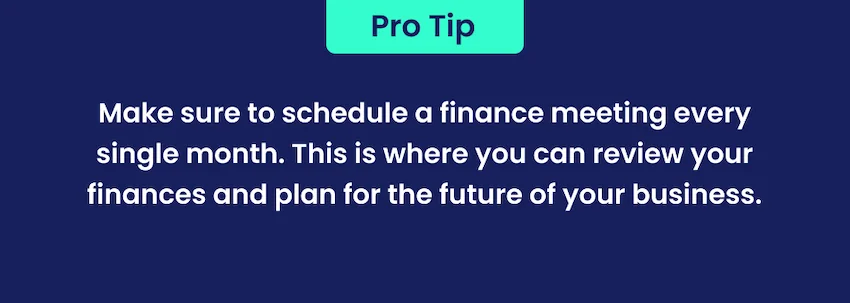
This meeting is important. You don’t just wake up every day and say, hey, I’m going to hire this person, I’m going to launch this new product, I’m going to hire this PPC agency. You need to have that finance meeting every single month where you review the income statement, balance sheet, and cash flow. You go through it line by line, you compare it to the previous month, you compare it to the same month last year. And that meeting is where you make decisions for your business. And that’s been the key to success for my business partner and I.
Here’s the truth. A lot of eCommerce businesses go under not because they’re unprofitable, they go under because they run out of cash. You guys know this from 8fig.
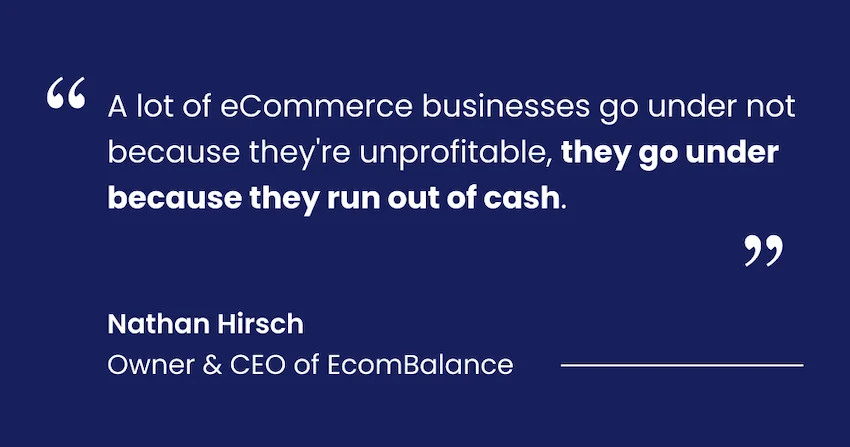
Having good cash flow is so important. So not only do you need a good monthly bookkeeping process, you need a way to look at your current cash flow, but also project future cash flow.
And we have a client, for example, that they’re a very seasonal business. They sell to college students, so during the summer they don’t really make a lot of sales, but they’re not just going to fire their entire team every summer and then hire them the next school year. They need to be able to pay their team to survive during those slow months.
So cash flow and projecting cash flow becomes so important. Having sources of funding becomes so important. Working with companies like yours and having good books is really a requirement to do that. It’s gonna be tough for you to raise money or get a loan or any kind of finances without clean books behind your business.
To start, you should never be doing your own bookkeeping as an entrepreneur. This is the mentality I try to get every entrepreneur out of. First of all, it’s a terrible use of your time. You should be focused on launching new products, getting on new marketplaces, maximizing your sales.
And second of all, most eCommerce sellers are just bad at bookkeeping. They don’t have a bookkeeping degree or a CPA degree or anything like that, and most of the time when they end up doing their books, they just have to pay to get it redone later. Not to mention decision making and being able to make decisions on time is important. So getting your books by the 15th each month, it’s hard to do when you’re the person doing it. But even if you were a CPA in a past life, I would argue that it’s a bad use of your time.
The other issue that people have is they are not using a tool like A2X to connect to the different marketplaces and pull in data into QuickBooks or Xero or whatever accounting software they’re using. They’ll just take the deposit into their bank account from Amazon. They’ll put that as the top line of their income statement, and that is incorrect.
You need to factor in Amazon fees, refunds, returns. And if you want an accurate picture of how your business is doing, you need to be able to pull in accurate data. And just connecting Amazon to QuickBooks or looking at Amazon sales reports is not the most efficient or most accurate way to do that.
So it’s important, not only do you get the mentality of hiring a good eCommerce bookkeeper, but you also have the right set up behind it. You have QuickBooks or Xero, the top two accounting tools. You have A2X to pull in data, so you have all the fees and everything correctly. You’re using business bank accounts that allow you only access so that your bookkeeper doesn’t need to ask you for statements every single month and that you’re not intermingling personal and business, which can set you up with issues with the IRS down the line.
So having that right set up is what you should do before you even get to that eCommerce bookkeeper.
We talked about a few of them: not having the right set up, not using A2X to pull in data, or taking the money deposited in your bank account and having that as a top line of your income statement. Another thing that people don’t think of is setting your books up in accrual.
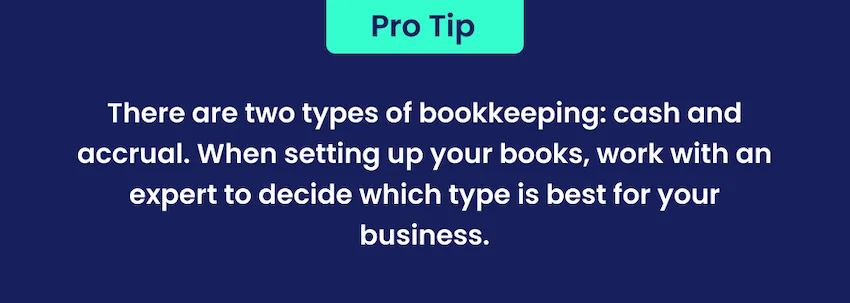
Now there’s two types of bookkeeping: there’s cash and accrual.
Cash means whenever you buy something, that’s when it appears on your income statement. Accrual means if you’re buying inventory and you’re going to sell that inventory over the next three months, it’s going to be spread out over the next three months.
Depending on your business, and you should consult with your CPA, cash or accrual might make more sense. For bigger eCommerce businesses, usually accrual is the way to go, and it also is going to help you make better decisions because if you make a large inventory purchase in January, January might not look like the best month on paper. February, March, April might look fantastic. But what does that really tell you? How does that really help you make decisions on your business?
So getting at least your sales and cost of goods sold set up on an accrual basis is not only going to help you make better decisions each month, but it’s also going to help you get a better evaluation if you ever go to sell your eCommerce business in the future.
The most important KPIs for eCommerce sellers. To be honest, this is a tough question because it’s very unique for each business.
A good thing to look at is on a per marketplace basis. You want to have everything segmented out so you know how you’re doing on each marketplace. You might be selling on Amazon France, Amazon UK, Amazon U.S., but also for each SKU. You want to know the costs associated with that SKU, obviously the profit in the sales based on that SKU, so segmentation becomes key.
Tracking cash flow, that’s incredibly important as well. And then advertising, since Amazon has become much more of a pay to play, figuring out your cost per acquisition is a big piece of the puzzle.
The best way for eCommerce sellers to improve cash flow is to plan. Plan ahead, look ahead, you should be projecting out cash flow 10, 12, 16 weeks in advance.
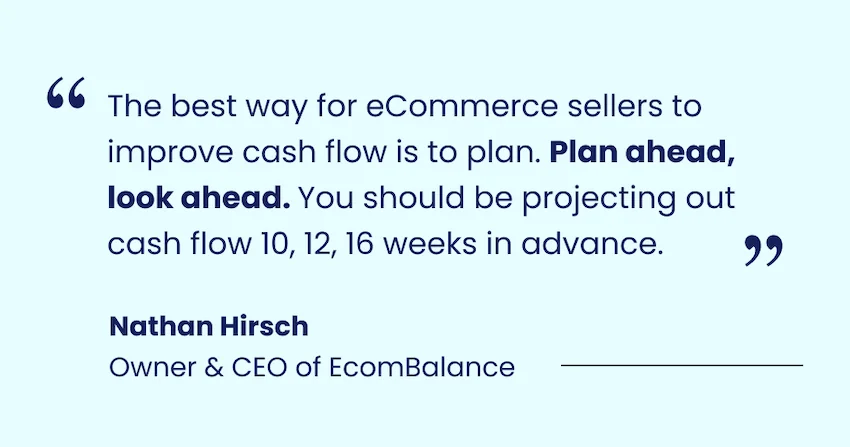
You should have different funding sources, like 8fig, available. You don’t want to wait until you absolutely need it to reach out to someone like you guys.
And also to just make sure that you’re making good decisions based on accurate numbers. Some of the ways that people run out of cash is they’re making poor decisions, they’re buying too much inventory, they’re hiring people that they can’t afford, and they’re doing that because they’re just guessing and they’re not looking at their actual monthly books.
Businesses should be planning ahead at least 16 weeks when it comes to cash flow. Now, if you’re a larger business or you’re a more seasonal business, you might have to look a quarter ahead or two quarters ahead. Now, with that, the farther you get ahead, a lot of times the less accurate it is.
It’s kind of like setting sales goals. You can set sales goals for next year, but a lot of times there are so many factors that go into that that it’s tough to do.
But it’s always a good idea to look ahead. I always recommend for eCommerce businesses to always look 16 weeks ahead.
I think one of the biggest misconceptions that eCommerce sellers have is that they’re only looking at the income statement. They should be looking at the cash flow statement and the balance sheet every single month.
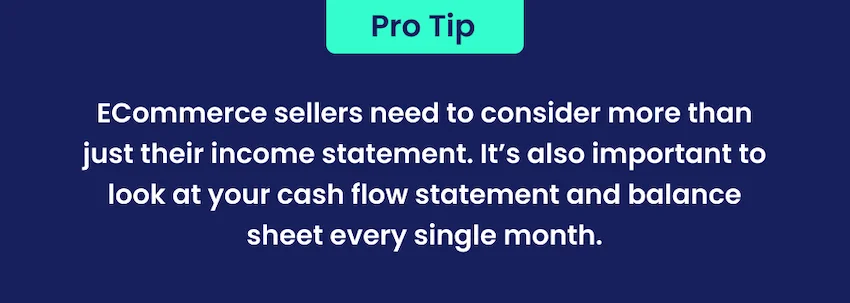
Now, I used to run a business, FreeUp, that was a freelance marketplace and it was remote. We didn’t have any office space, there wasn’t any inventory. So the balance sheet didn’t really tell us very much.
ECommerce businesses are way different. The balance sheet is incredibly important, especially if you have a warehouse, if you’re buying lots of inventory. You need to know the health of your business, your assets versus your liability.
So in that monthly finance meeting that you should be having every single month, and if you want our agenda for the meeting that we run, go to ecombalance.com and you can grab ours. You should be looking at not just the income statement, which is what every entrepreneur loves, but also the balance sheet and the cash flow as well.
Really, the lifeblood of your business should be in QuickBooks, should be in Xero, should be the income statement, balance sheet, cash flow, but there are other tools you can use in addition.
There’s tools like Sellerboard that can show you sales on a day-to-day or week-to-week basis, but this does not replace bookkeeping. It’s an add on, and I think that’s where a lot of people go wrong.
They get a tool like Sellerboard, and they’re tracking their sales and they say, hey, I’m doing bookkeeping. That’s not bookkeeping. It’s great if that helps you make additional decisions that you can’t wait until the end of the month to make, but it doesn’t replace monthly bookkeeping.
My top financial tip for eCommerce businesses is to know your numbers. The reason we were able to sell FreeUp is when we first met with a buyer, they asked us a lot of questions about our business, and because we had had these monthly finance meetings every single month, we knew our business inside and out. We knew our margins, we knew the number of clients, we knew our revenue, our projections, our trends. And when they finally got to due diligence, everything we told them on those initial calls matched everything that was in our book.
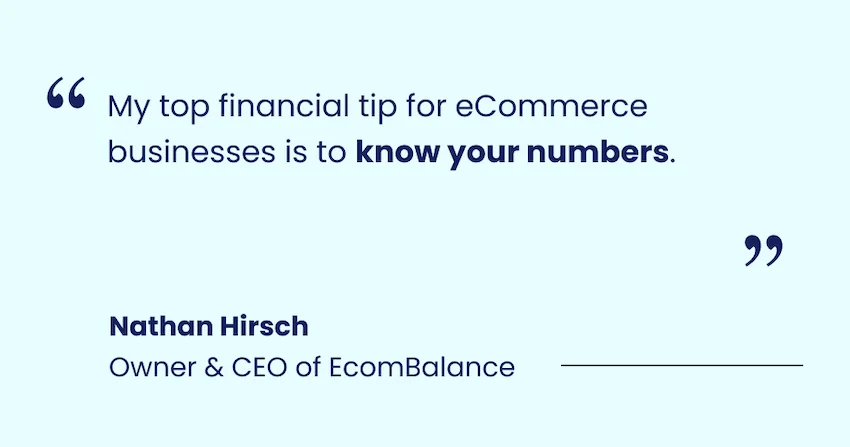
So not only do you need clean books and you don’t want to wait until the last minute when you need funding or you’re trying to sell your business to get those clean books. But you also need to know your numbers inside and out, and that’s going to help you accomplish whatever your goals are.
It’s a good idea to hire an external bookkeeper for your eCommerce business because eCommerce bookkeeping is hard, and if you don’t know eCommerce bookkeeping, it’s going to be hard for you to manage or train someone internally to do that.
Not to mention, most eCommerce businesses don’t need a full-time bookkeeper to work for them. So by hiring a monthly bookkeeping service, you’re going to ensure not only do they know eCommerce, do they know bookkeeping, do they have systems and processes to get the data they need from you every single month, but also you’re going to get your books on time.
It’s one less thing you have to manage, one less thing that you have to worry about, and you can just focus on having that monthly finance meeting every single month based on the reports that they provide you.
My advice about inflation is to know your numbers and know your margins, and that’s going to help you make decisions whether you can cut payroll, whether you can increase costs, whether you have to look for a cheaper inventory supplier.
We’re at the stage where there’s so much competition, there’s so much going on in the eCommerce world that the difference is made at the margins, and the only way you can make good decisions to help with the margins is if you know what those margins are and you’re getting accurate data every single month.
Subscribe to the eCommerce newsletter for
top industry insights

Crack the code to funding your eCommerce business with this step-by-step guide, and learn how to secure the capital you need to grow while staying on top of your strategy.

Stuck with extra inventory after Amazon’s Spring Sale? Learn five smart strategies to clear unsold stock, boost cash flow, and avoid future overstocks with smarter inventory planning.
![BFCM: The ultimate guide to eCommerce sales [2025]](https://www.8fig.co/wp-content/uploads/2023/09/cover-2-768x432.jpg.webp)
Get ready for Black Friday and Cyber Monday with our guide on maximizing sales through smart inventory management, effective marketing strategies, and leveraging eCommerce financing.
